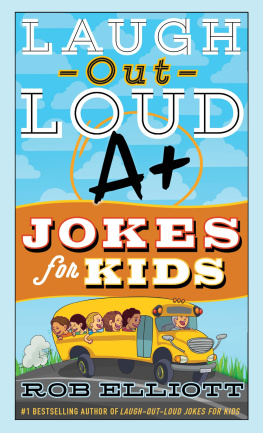William Berg - Philogelos: A Laugh Addict
Here you can read online William Berg - Philogelos: A Laugh Addict full text of the book (entire story) in english for free. Download pdf and epub, get meaning, cover and reviews about this ebook. genre: Detective and thriller. Description of the work, (preface) as well as reviews are available. Best literature library LitArk.com created for fans of good reading and offers a wide selection of genres:
Romance novel
Science fiction
Adventure
Detective
Science
History
Home and family
Prose
Art
Politics
Computer
Non-fiction
Religion
Business
Children
Humor
Choose a favorite category and find really read worthwhile books. Enjoy immersion in the world of imagination, feel the emotions of the characters or learn something new for yourself, make an fascinating discovery.

- Book:Philogelos: A Laugh Addict
- Author:
- Genre:
- Rating:4 / 5
- Favourites:Add to favourites
- Your mark:
- 80
- 1
- 2
- 3
- 4
- 5
Philogelos: A Laugh Addict: summary, description and annotation
We offer to read an annotation, description, summary or preface (depends on what the author of the book "Philogelos: A Laugh Addict" wrote himself). If you haven't found the necessary information about the book — write in the comments, we will try to find it.
Philogelos: A Laugh Addict — read online for free the complete book (whole text) full work
Below is the text of the book, divided by pages. System saving the place of the last page read, allows you to conveniently read the book "Philogelos: A Laugh Addict" online for free, without having to search again every time where you left off. Put a bookmark, and you can go to the page where you finished reading at any time.
Font size:
Interval:
Bookmark:
A WORD ON THE TEXT
The text of Philogelos comes to us from several manuscripts rangingfrom the eleventh to the fifteenth centuries. They all differ more or less from each other inthe number, order, and actual words of the jokes. All of them, ofcourse, go back to a much earlier archetype, probably (judging fromcontent and language) from the fourth century C.E. The collectionincluded some jokes from an earlier era, and undoubtedly acquired afew extra jokes as the centuries rolled by, but the main body of thetext belongs to the age of Constantine, when the ancient civilizationwas still in full swing, though somewhat battered and bruised frombarbarian invasions and internal conflicts. The world was not yetChristian (though there were plenty of Christians about), and theancient gods were still paid their due.
The task of an editor is to collate the relevant manuscripts and toreconstruct (as nearly as possible) the archetypal text. This hasbeen most recently accomplished by R.W. Dawe, whose Teubner editionof 2000 deserves much praise. In my translation of Philogelos I've followedDawe's Greek text most of the way. Where I've decided on avariant reading of my own, or interpolated a word or two (for thesake of the humor, mostly), it's thanks to Dawe's testimony tothe full range of those other possibilities.
Several manuscripts attribute authorship to one man, Hierocles. Others addthe name of a man of letters (grammatikos),Philagrius. All guesswork to the contrary, we really have no ideawho these people were, whether they worked as a team to compile thejokes, or whether one lived years or generations after the other. Though Philogelosis the only joke book to survive from ancient (not medieval) times,we know that plenty of others had existed, at least from theclassical period onward. So Hierocles and Philagrius, if they wereever real, undoubtedly had competitors.
Despite the differences, great and small, among the various manuscripts ofour joke book, they are all in harmony on one point: its title. Asa title, Philogelosis unique: it confirms the integrity and originality of the workitself. Literally, it means lover of laughter, and isobviously meant as a parody of those other, more serious,philo-compoundslike philo-sophos(lover of wisdom) and philo-timos(lover of honour). In the end, the title is perfect for thework, as a sort of backhand gesture at those who tend to takeanything in human life too seriously. After all, a life withoutlaughter, as the title implies, is not worth living.
Let's tarry a bit outside our tattered tent and chat with some of theactors from within as they don their chitons and cloaks and makethemselves up for their roles oh dear, I'm afraid a good halfof them are quite naked, and exhibiting the most extraordinarybehavior. Try not to stare at those hernias and other deformities. Let's not appear too curious about the eunuchs, even though theyseem to parade their condition without concern. And do try to avoidthat gaggle of drunken reprobates they've set up their own barout there, you see, and are not above harassing innocent onlookerslike yourselves. No, look over here these people are much morepolite, more conversational if they just wouldn't get so close! Don't they have toothbrushes, or dentists? Ye gods, what a stink!
If only we can make our way back to the entrance through those rivalgangs of students violent, of course (don't provoke them), butcolorful, don't you think, with their striped gowns reflectingallegiance to one inept professor or another, for whom they'rewilling to suffer bumps and bruises they'll have difficultyjustifying tomorrow; their wee dull polls aren't really trained tothink, but you should hear them declaim!
We're not the only foreign visitors, of course. Ugh, yes, there areThracians from Abdera keep to themselves, you know, and thankheaven for that. But look, there's a crowd from Kyme just acrossthe water from Lesbos, and over there real Sidonians, all the wayfrom Syria! Funny how all these foreigners seem to wander aimlessly,always bumping into each other. Wonder if there's really somethingto those rumors about their I.Q.?
Oh, look, there's a side entrance, the one with the threadbare awning. Let's make for it, tip-toeing carefully past this gang of hotheads. Look at the size of those chips on their shoulders! No, no, don'teven let your eyes meet theirs. Every one spoiling for a fight, asif he really enjoyed being a stereotype! Even that swarm of bawdyold women is keeping its distance.
You're worried by the size of the athletes guarding the entrance? Don't be! They're all a bunch of ponces and cross-dressers. Watch how quickly this one fades, and I'm only scowling at him. Pass on through, ladies and gentlemen, under the tent we go, intothat infinite Greek sunset where laughter dwells, and look themarket's still open. Welcome to Philogelos!
Our stroll through the world of the fourth century takes us first along acobbled avenue of tenements that finally give way to fancier flats. Gradually, the air becomes thicker with a heady mixture of spices,rotten fruit, sewage, incense and donkey dung. We emerge, at last,in the market place itself, a vast, crumbling pavement flanked bypublic buildings of every sort arcades, gymnasiums, city hall andcourthouse, baths, theatres, temples. The marble facades, onceresplendent, are now hopelessly decayed; the magnificent publicbuildings with their Corinthian columns are now in serious disrepair.
No worry: the bustling populace is still here, the incessant babble ofhawkers and shoppers, the shouted insults, the challenges, theoccasional fist-fight, the collapsing stall. And the essentialservices still function, above all the public bath. There the wateris not as fresh as it was in your granddad's day, but a cool dip inthe pool is still possible, a soak in a hot tub, a relaxingconversation with your fellow citizens in the steam room.
And in the gymnasium, there's still a physical trainer for the youth,and a schoolmaster or two to lecture restless students on geometry orliterature, drawing or music, preparing them for a future asfull-fledged citizens.
The luckier ones the richer ones, that is will be able tocontinue their studies in the great university centers, in Antioch inthe eastern Mediterranean, in Nicomedeia in Anatolia, inConstantinople on the Bosporus, in Egyptian Alexandria, or ifthey're really, really lucky in golden Athens, theuniversity of universities, the school of Hellas, as Periclesonce called it. For what other city contains so many hallowed placesof learning the Academy of Plato, the Lyceum of Aristotle, theStoa of Zeno, the Garden of Epicurus?
Since close to half of Philogelos is occupied with the antics ofscholastikoi university men at home in their villages,in their student digs, and sometimes even on the battlefield, let ustake a moment to view their situation.
Philogelos assumes (and so should we) that Athens was the first choice forhigher education: most of student life is imagined in Athens. Whether the scholastikos traveled there by land or sea, from acoastal town in Ionia or Thrace, or from far-flung Libya or Syria,the expenses of getting to Athens, and of living there, were great. Room and board, tuition, and books were a terrific financial burdenon most fathers, and some of them even took up a collection amongfriends and neighbors back home to sustain their sons through a four-or five-year struggle with higher learning.
Was it all worth it? What outcome was anticipated? The answer lies inthe Greek notion of citizenship and civic responsibility. Tocontribute fully to your
Font size:
Interval:
Bookmark:
Similar books «Philogelos: A Laugh Addict»
Look at similar books to Philogelos: A Laugh Addict. We have selected literature similar in name and meaning in the hope of providing readers with more options to find new, interesting, not yet read works.
Discussion, reviews of the book Philogelos: A Laugh Addict and just readers' own opinions. Leave your comments, write what you think about the work, its meaning or the main characters. Specify what exactly you liked and what you didn't like, and why you think so.












